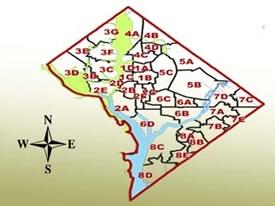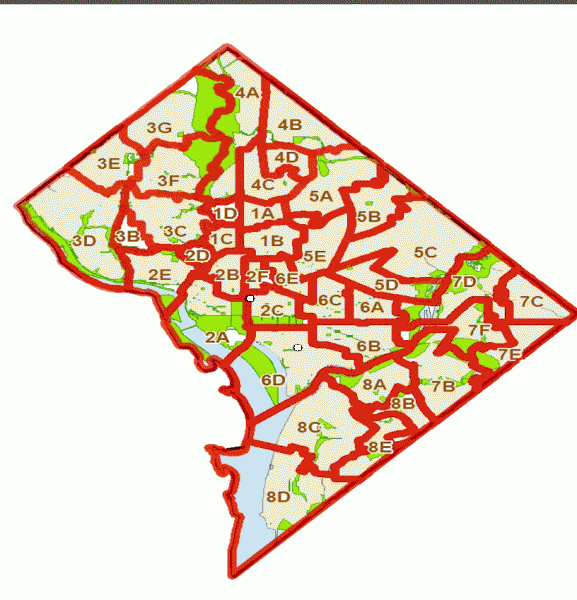anc map dc
Related Articles: anc map dc
Introduction
With enthusiasm, let’s navigate through the intriguing topic related to anc map dc. Let’s weave interesting information and offer fresh perspectives to the readers.
Table of Content
Navigating the Neighborhood: A Guide to the ANC Map in Washington, D.C.

Washington, D.C., a vibrant and diverse city, is organized into a unique system of neighborhood representation known as Advisory Neighborhood Commissions (ANCs). These commissions, established in 1975, serve as crucial links between residents and the District government, providing a platform for local advocacy and engagement in civic affairs. Understanding the ANC map, which visually depicts the boundaries of these commissions, is essential for anyone seeking to participate in local decision-making and contribute to the betterment of their neighborhood.
The Structure of ANCs: A Framework for Community Engagement
The District of Columbia is divided into eight wards, each further subdivided into a network of ANCs. These commissions, numbered consecutively within each ward, serve as the primary avenue for residents to voice their concerns, influence local policy, and advocate for improvements within their specific geographic area.
Understanding the Map: Decoding the Neighborhood Boundaries
The ANC map, readily available on the District government’s website and various online platforms, is a visual representation of this intricate network. It depicts the boundaries of each ANC, providing a clear understanding of which commission covers a particular address or neighborhood. This map serves as a valuable tool for:
- Identifying the relevant ANC for a specific address: Residents can easily determine which ANC represents their home or business by locating their address on the map.
- Understanding the geographic scope of each commission: The map provides a visual overview of the areas covered by each ANC, highlighting their boundaries and the neighborhoods they encompass.
- Locating ANC meetings and events: The map can be used to identify the locations of ANC meetings and other community events, enabling residents to actively participate in local governance.
The Role of ANCs: A Bridge Between Residents and the Government
ANCs play a vital role in fostering a strong sense of community and ensuring that residents’ voices are heard in the decision-making process. Their primary functions include:
- Reviewing and recommending zoning and land use changes: ANCs have the authority to review and recommend changes to zoning regulations and land use plans within their respective areas, ensuring that development aligns with the community’s vision.
- Advocating for local projects and improvements: ANCs serve as a platform for residents to advocate for projects and improvements that benefit their neighborhoods, such as infrastructure upgrades, park enhancements, and public safety initiatives.
- Providing feedback on proposed legislation and regulations: ANCs can offer valuable feedback on proposed legislation and regulations that affect their communities, ensuring that local perspectives are considered in the policy-making process.
- Connecting residents with District government services: ANCs act as intermediaries, connecting residents with relevant District government agencies and services, facilitating communication and problem-solving.
Engaging with ANCs: Your Opportunity to Make a Difference
The ANC system provides a unique opportunity for residents to actively participate in shaping the future of their neighborhoods. Here are several ways to engage with your local ANC:
- Attend ANC meetings: Regularly attending ANC meetings allows residents to stay informed about local issues, voice their opinions, and participate in the decision-making process.
- Contact your ANC commissioner: Residents can contact their designated ANC commissioner to discuss concerns, share ideas, and advocate for specific issues.
- Join an ANC committee: Joining an ANC committee, such as the Transportation or Public Safety committee, allows residents to contribute their expertise and actively participate in addressing specific issues.
- Volunteer for ANC events: Contributing to ANC events and activities, such as community cleanups or neighborhood festivals, fosters a sense of community and provides opportunities to connect with fellow residents.
Frequently Asked Questions about ANCs in Washington, D.C.
Q: How can I find my ANC commissioner?
A: The District government’s website provides a searchable database of ANC commissioners, allowing residents to easily locate their designated representative by entering their address.
Q: What are the meeting schedules for ANCs?
A: ANC meeting schedules vary depending on the specific commission. However, most ANCs hold regular meetings, typically once or twice a month. Information on meeting schedules and locations can be found on the District government’s website or by contacting the relevant ANC commissioner.
Q: How can I submit a request or complaint to my ANC?
A: Residents can submit requests or complaints to their ANC by contacting their commissioner or attending an ANC meeting. Most ANCs have established procedures for receiving and addressing resident concerns.
Q: What are the qualifications for becoming an ANC commissioner?
A: To become an ANC commissioner, an individual must be a registered voter residing within the boundaries of the relevant ANC. Candidates typically run in elections held every two years.
Tips for Effective Engagement with ANCs
- Be informed: Stay informed about local issues by attending ANC meetings, reading local news, and participating in community events.
- Be respectful: Engage in respectful dialogue with fellow residents and ANC commissioners, acknowledging diverse perspectives and seeking common ground.
- Be prepared: Prepare for ANC meetings by researching relevant issues and formulating clear and concise statements.
- Be persistent: Continue to advocate for your concerns, even if they are not addressed immediately.
- Be patient: The ANC system is a democratic process that requires time and effort to achieve meaningful change.
Conclusion: Empowering Communities through Local Representation
The ANC system in Washington, D.C., serves as a vital mechanism for empowering residents to participate in local governance and shape the future of their neighborhoods. By understanding the structure and functions of ANCs, engaging with their activities, and actively advocating for their communities, residents can contribute to creating a more vibrant, equitable, and responsive District of Columbia. The ANC map, a visual guide to this system, serves as a valuable tool for navigating the intricate network of neighborhood representation and facilitating active civic engagement.








Closure
Thus, we hope this article has provided valuable insights into anc map dc. We thank you for taking the time to read this article. See you in our next article!